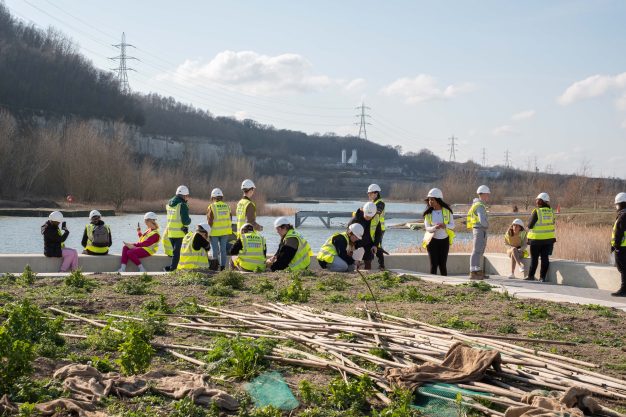
Previewing Dublin 2022 – Michaela Freeman, This Must Be the Place
Our flagship bi-annual Child in the City World Conference is almost upon us. Tomorrow we begin welcoming speakers and visitors to Dublin for our 10th anniversary event, Making Connections. And there’s just time to introduce to you one more speaker – Michaela Freeman, who has 25 years of experience working in the arts, and will be appearing in Dublin at our parallel session, Connecting children’s participation to urban policies.
CiTC: Can you please outline your role, and also that of the specific department and/or organisation that you work for?
Michaela Freeman: I work as a curator and project manager for This Must Be the Place, a project by Cement Fields. We are a visual art organisation based in Kent, in the UK. We invite people to collaborate with artists to encounter, research, make, and exchange views on contemporary art, and broaden access to art by creating learning opportunities for young people to develop imagination, skills and find meaningful pathways into creative careers.
CiTC: The theme of our conference in Dublin is ‘Making Connections’, and focuses on how we make connections between both children and cities, and the various disciplines and professionals. Can you summarise how this relates to the presentation you will be giving in Dublin?
MF: Ebbsfleet Garden City is the UK’s first new garden city for 100 years, since the development of Letchworth and Welwyn Garden Cities early in the 20th century. The scale of this new city is ambitious. A new city centre, seven new city-scale parks, 15,000 new homes, 30,000 new jobs and nine new schools will be in place by 2035, alongside the existing communities in Northfleet and Swanscombe.
This Must Be the Place responds to this pivotal moment in time for North Kent, supporting radical, youth and art-led action research. This programme of residencies, workshops and projects, is created by artists and other practitioners in collaboration with young people living in the new Ebbsfleet Garden City and surrounding areas, particularly those aged between 15-24y. We also work with schools and colleges, and the organisations that are planning and building the new city – supporting young people to consider and shape the design of Ebbsfleet, while creating cultural leaders for the future. We want to make sure they are involved in all the stages of the planning process.

On Friday, we will be taking about what has been achieved so far. This includes The Hand Print Wall (above) – a recently realised project which was designed by one of our young participants, Precious Othieno. She will be with us at the conference, sharing her own experience of designing for public spaces.
CiTC: Are there any particular elements from the the creative/art world of culture which are ‘transferable’ best practice – i.e lessons which could be learned through being adopting and adapted elsewhere?
MF: Of course, this is exactly what we are aiming to demonstrate with This Must Be the Place programme. By giving our participants access to various creative practitioners, we empower them with knowledge, tools and confidence. Our design programme earlier this year, for example, started with a photography workshop and manifesto flags making, before progressing to city planning. This has inspired a series of very fruitful and unexpected conversations.
CiTC: In your view, do we, as a society, talk to and take seriously enough the views of children and young people as regards their ideas for how urban design can influence their futures?
MF: Recently this has been discussed much more and that’s a great thing. We also need to make sure that action follows the words and that the young people’s input is acted on. This is what our project is about
CiTC: If you could have the audience in Dublin take away just one key message from your presentation, what would it be?
MF: Don’t forget about the older ‘kids’. We have been taken aback by how creative and considerate our young people’s ideas for the public space were. This age category (15-24y) is often overlooked and not included in the urban planning which is a shame because they have so much to say and contribute. Come to see us on Friday at Parallel Session 5.1 to find out more.
Michaela Freeman is taking part in parallel session 5.1, Connnecting children’s participation to urban policies, on Friday 7 October, from 0930-1100, in the Courtyard Room, Printworks Centre, Dublin Castle.
Making Connections is being held in Dublin from October 5-7, and there is still time to book your place – click here for details of how to register.




